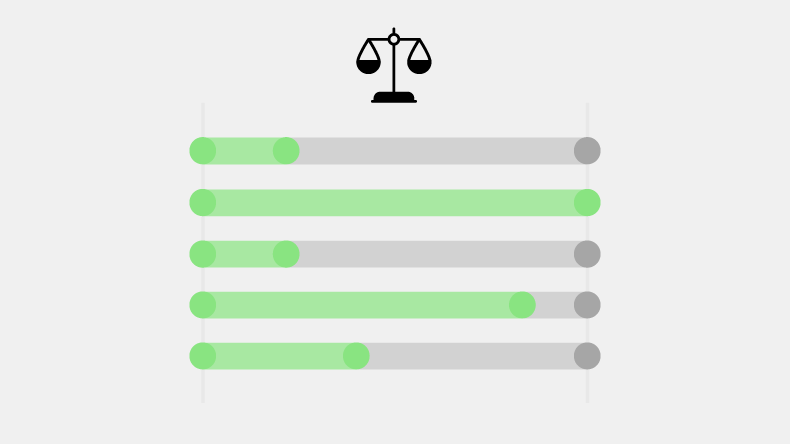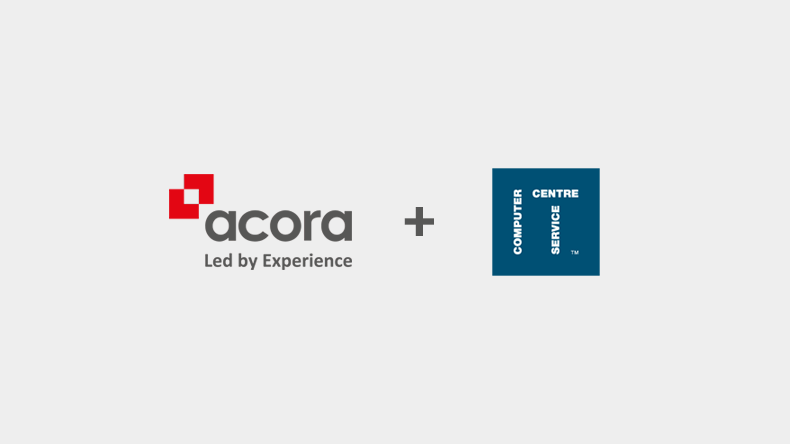Cloud Technology Solutions
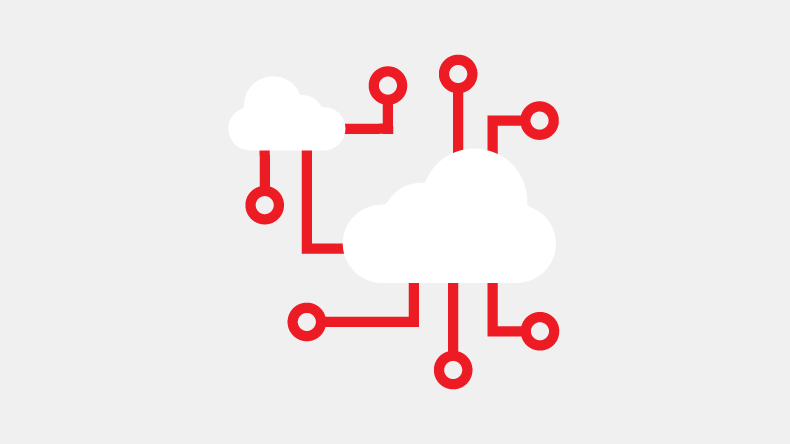
Understanding cloud technology solutions and how they can help you meet your business needs can be overwhelming.
That’s why we’ve created this article:
To give you the answers you’ll need when selecting cloud technology solutions for your business.
So if you’ve got 5 minutes to spare, we recommend you have a read.
Let’s get started:
Contents
What is meant by a cloud technology solution?
A cloud technology solution can be referred to as a virtually stored digital resource that can be accessed via the internet (“Cloud”) through another provider's cloud hosting environment to provide faster innovation and flexible resources.
This can include:
- Applications
- Networks
- On-demand Services
- Storage
Now, let’s take a look at the benefits:
What are the benefits of using cloud-based technology?
In an increasingly digitised world, your workforce should be able to collaborate on internal systems and access files securely from anywhere.
Sounds simple, right?
But what other benefits are there to using cloud solutions?
Efficiency
Maximising outputs from given inputs to minimise your costs is what efficiency is all about.
By improving efficiency, you can reduce your costs and improve your competitiveness.
So, how can cloud solutions improve your efficiency?
Let’s take a look:
- Accessibility - Allow your workforce to access the resources they need from anywhere, at any time.
- Save time – Due to increased accessibility, the time it takes to get up and running shrinks from days to minutes.
- Save money – Shift your IT from a capital expenditure (CapEx) to an operating expenditure (OpEx)
- Speed to market – Bring your applications/products to market quickly, with all of the above benefits.
Flexibility
Adapting to change is vital for your business to thrive.
People want to have and do things when they want.
If you can offer flexible services, you’re more likely to have a loyal customer base.
It’s much cheaper to retain existing customers, than it is to find new ones.
But how does this all tie in with cloud solutions?
Let us explain:
- Scalability – One of the most impressive benefits. Your cloud grows with you. Add power, storage, users, branches or applications to suit your requirements, whenever you want. Plus scale back, should you want to downsize.
- Services – Determine your level of control. Choose from Infrastructure as a Service (IaaS), Platform as a Service (PaaS), or Software as a Service (SaaS).
- Storage – Depending on your security requirements etc., you choose between a public, private, or hybrid offering.
- Security – With intrusion detection, firewalls, encryption, and more you can keep your data secure.
According to Arcserve, by 2025, there will be over 100 zettabytes of data stored in the cloud.
To put this in perspective, a zettabyte is a billion terabytes (or a trillion gigabytes) 😅
Note to self: That’s a lot.
Now, let’s take a look at some common use cases:
What are the most common use cases of a cloud-based solution?
There are many use cases for cloud-based solutions.
Below, we take a look at the most common ones:
- Cloud storage
- Cloud migrations
- Data security & compliance
- Workplace optimisation
- Business continuity
Cloud storage
Perhaps the most obvious use case.
Cloud storage is the process of storing data and files online that can be accessed via either a dedicated private network connection or the public internet.
Common examples include:
The above are all public cloud services.
You could also use a private cloud dedicated to your business.
Either service has its pros and cons.
According to GoodFirms, Google Drive is the most used for personal cloud storage with 94.44%.
Cloud migrations
A cloud migration is the process of transferring data, workloads, IT resources, or applications to a cloud environment.
This includes cloud-to-cloud migrations too.
Businesses migrate to the cloud because it gives them access to virtually limitless computing resources.
Data security & compliance
Data security and compliance is crucial to any business looking to keep its applications and data protected.
It comes with its own advantages, such as:
- Lower upfront costs
- Reduced ongoing administrative/operational costs
- Easier scaling
- Increased reliability & availability
- Improved DDoS protection
Maintaining a strong security posture can help your business to achieve the benefits of cloud computing.
Workplace optimisation
Businesses serious about growing know they need to have the right tools and technology in place to succeed.
With cloud computing, it has become a lot easier to optimise the way they operate and understand how they are performing.
So, how does workplace optimisation help businesses to grow?
- Software is always up-to-date, improving, and evolving.
- Ability to make informed decisions with big data.
- Cost-effective scalability that grows with the business.
- Flexibility to manage the business anywhere, at any given time.
- Greater productivity with instant communication and collaboration tools.
Business continuity
Traditionally, businesses would backup data to on premise tape/flash drives or servers.
This was a very labour intensive and time consuming process
With cloud computing, business now have access to timely and error-free data recovery to ensure continuity for their business.
Business continuity is achieved via:
- Regular backups
- Reduced downtime
- Scalability aligned to your business
- Reduced impact of DDoS attacks
- Reduced recovery times
- Information security management
Now, let’s take a look at the main types of cloud computing:
What are the main types of cloud computing?
There are 3 main types of cloud computing.
(Not to be confused with the cloud computing models)
They are:
- Public Cloud
- Private Cloud
- Hybrid Cloud
Let’s take a look at each:
Public Cloud
When people think of cloud environments, they are most likely thinking of the public cloud.
All the big players, Amazon, HP, Google, IBM, and Microsoft operate in this space.
Amazon Web Services (AWS) is by far the most popular and widely used cloud service in the world with 31% of the total market share (Canalys).
Followed by Microsoft Azure with a 20% market share.
In a public cloud, you share the same hardware, storage and network devices with other business.
Usually, offered via subscription or on-demand pricing scheme.
Public clouds are set up the same way as private clouds.
It becomes public when it’s provided as a shared resource to multiple users.
What are the advantages of the public cloud?
A public cloud can provide the following advantages:
- No maintenance - your service provider provides the maintenance.
- Scalability - Resources are made available to meet your business needs.
- Lower costs - you pay only for the service you use.
Private Cloud
Private clouds are dedicated to the needs and goals of a single business.
That includes all hardware and software resources.
They can run on the business premises or in an external data centre.
This option proves to be more cost-effective than public clouds.
Especially, when running workloads in the long term and at scale.
What are the advantages of the private cloud?
Private clouds can include all of the above public cloud advantages, plus:
- Security & compliance - Meet your compliance regulations with full control over your underlying infrastructure.
- Long-term savings – Recurring overheads and your Total Cost of Ownership (TCO) will be significantly lower over a 3 year period
- Flexibility & control – Manage your own setup or let your provider take control – it’s up to you.
Hybrid Cloud
Put simply, hybrid cloud is a mix of public and private cloud.
Businesses deploy applications between private and public environments to meet their computing needs.
Hybrid clouds consist of 3 main components:
- A public IaaS platform
- Private environment
- A network connection between the two above
What are the advantages of the hybrid cloud?
- Control - Maintain a private infrastructure for sensitive assets or workloads that require low latency.
- Flexibility - Migrate workloads to and from your private infrastructure and a vendor's public cloud whenever necessary.
- Cost management - Choose to run workloads in whichever environment is more cost-effective.
Now, let’s take a look at the cloud computing service models:
What are the different types of cloud computing service models?
Cloud computing services can be divided into 3 core models.
They are:
- Infrastructure as a Service (IaaS)
- Platform as a Service (PaaS)
- Software as a Service (SaaS)
The above models are sometimes called the cloud computing stack.
This is because they are built on top of one another.
So let’s take a look at the models in more detail:
Infrastructure as a Service (IaaS)
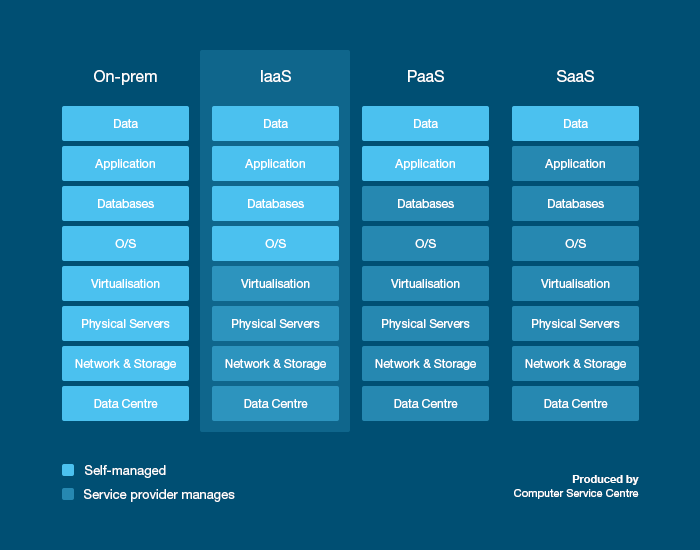
IaaS is used for Internet-based on-demand access to storage and computing power on a pay-as-you-go basis.
As the name implies, the provider manages the infrastructure, while you would manage things like apps, middleware, and operating systems.
IaaS manages the following resources:
- Virtualisation
- Physical servers
- Network & storage
- Data centre
Common examples of IaaS include:
- Amazon Web Services (AWS)
- Google Cloud Platform (GCP)
- Microsoft Azure
- Yours truly 😉
Platform as a Service (PaaS)
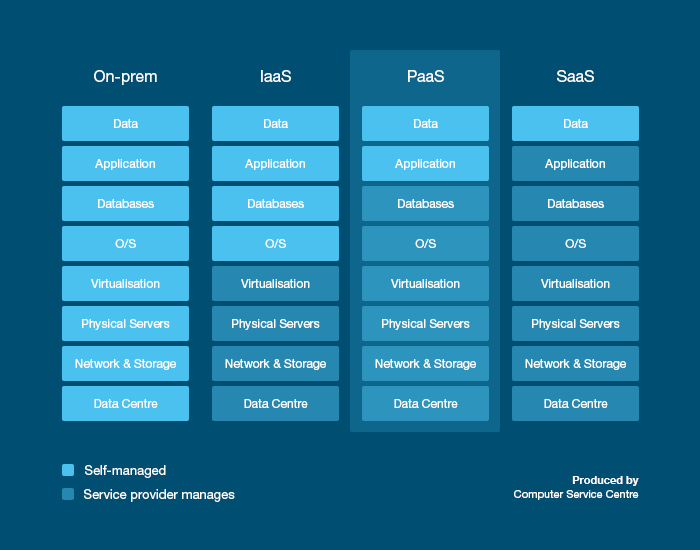
PaaS gives developers the tools to build and host web applications.
It provides an environment for application development and management.
Much like IaaS, it includes:
- Virtualisation
- Physical servers
- Network & storage
- Data centre
However, it also includes:
- Operating systems
- Databases
Common examples of PaaS include:
Software as a Service (SaaS)
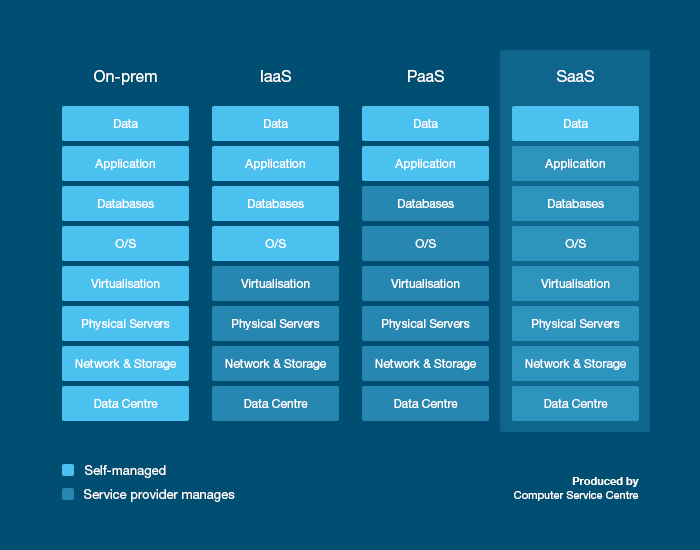
SaaS is used for hosting web-based applications, leased on a subscription basis.
It eliminates the need to have an app installed locally your computer.
Creating greater access to the software for your team.
The SaaS model is very popular with start-ups looking to launch their applications quickly.
Common examples of SaaS include:
We really hope you enjoyed our take on cloud technology solutions.
Now we’d like to hear from you:
Do you have any further questions about this topic?
Perhaps you are considering it at the moment?
Either way, let us know your thoughts.
Did you know?💡
We specialise in cloud computing services and have our own UK-based Tier 3 data centres.
We can help with advice, installations, migrations, support, cloud backup solutions and anything else in between.
Get in touch today or give us a call on +44 (0)1603 431200.
Back to the blog.
Back to the blog.

